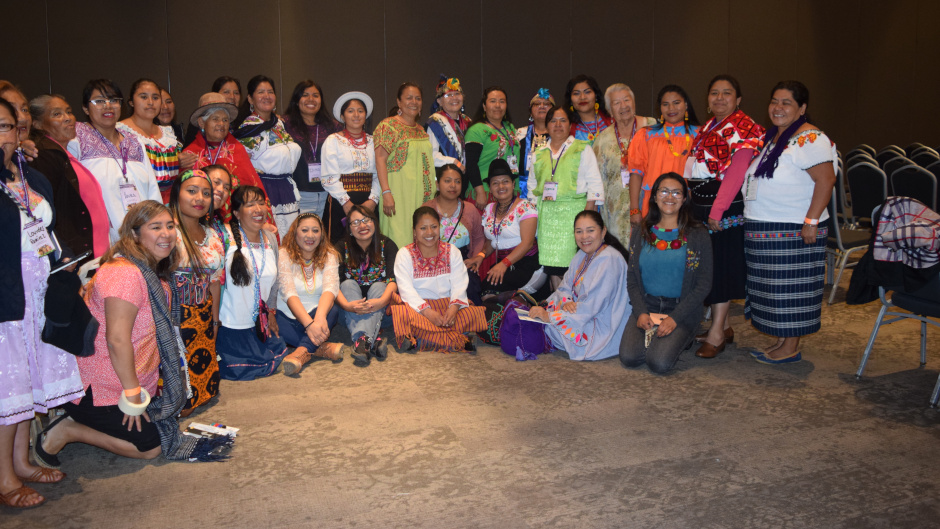Miami Law’s Human Rights Clinic submitted a request in November 2019 to the Working Group for the San Salvador Protocol of the Organization of American States to ask that the rights of rural women do not continue to get pushed into the background. The submission specifically asked for the revision of the Protocol’s indicators of progress on the right to food to be more inclusive of the rights of women who live and/or work in rural areas. Indicators of progress are a way to monitor the fulfillment of human rights.
The submission was authored in Spanish by second-year law students Raul Herrera JR, Isabelle Janssen, and Gabriela Valentín Díaz under the supervision of Prof. Denisse Córdova Montes, and on behalf of 14 Indigenous, agricultural, and feminist advocacy and social movement organizations. These organizations were highly involved in the development of the submission, from highlighting a need for revision of the indicators of progress to providing key arguments through interviews.
“It was especially important for us to hear from women in the rural communities,” said Valentín Díaz. “The specific stories we were told, like Laura’s about the gas line, were key in finding compelling, efficient arguments that would show the Working Group why more protections are needed to help fulfill the right to food for these women,” she said.
The HRC requested the incorporation of two international human rights instruments into the indicators of progress that will allow the Protocol to more completely protect the right to food of rural women: General Recommendation 34 from the Committee on the Elimination of Discrimination Against Women (GR 34) and the United Nations Declaration on the Rights of Peasants and Other People Working in Rural Areas (UNDROP). GR 34 and UNDROP contain specific provisions that protect the rights of women who live and/or work in rural areas and were developed with the participation of these women, thus accurately reflecting their experiences.
“The submission to the Working Group is a significant step to address the colonial and patriarchal legacies that are very much still alive today in the context of rural women’s right to food in the Americas,” said Córdova Montes. “Human rights indicators are important tools for civil society to monitor the implementation of human rights treaties at the local and national levels; they can be used to assess state progress and programs by requiring the gathering of adequate baseline data from which human rights-related progress can be measured.”
How the Indicators Should be Revised
The submission presented three categories in the Protocol’s indicators of progress that should be updated: equality and non-discrimination, access to justice, and access to information and participation. The indicators of progress for the Protocol under these categories contain significant gaps that impede the full realization of the right to food for women who live and/or work in rural areas.
More specifically, the submission argued that the indicators for equality and nondiscrimination should be revised to take into account historic barriers women who live and/or work in rural areas have faced, like the historic discrimination against women through the legacy of colonialism and gender-based discrimination. Furthermore, the indicators should provide accessible remedies that ensure justice for all women who live and/or work in rural areas. This should be achieved through policies, legislation and legal systems that provide nondiscriminatory access, physical access, and practical access by training officials on the rights of women who live and/or work in rural areas. Additionally, the indicators of progress for access to information and participation should guarantee rural women’s role in the definition of public policy and ensure the voices of women who work and/or live in rural areas are amplified.
Working Group Response
The Working Group responded to the submission in a letter commending the arguments presented and commented it will consider all of the arguments presented in future revisions with the participation of the countries party to the Protocol.
“It was both challenging and rewarding to advocate in Spanish,” said Herrera JR. “It truly underscored the universality of human rights and the need for advocates to equip themselves with the tools necessary for effective promulgation of causes in a globalized world.”
This request is part of a broader work plan for the HRC that includes the development of a manual of social movements and civil society organizations can use as guidance on how to protect the right to food of women who live and/or work in rural areas, which will be ready by the summer of 2020. The work plan also includes a series of webinars in English, Spanish, and French on the same topic. The English language webinar aired live and featured HRC students Gabriela Valentín Díaz and Kadian Crawford in March 2020.

